
Potatoes used to be considered a forbidden food for anyone trying to eat healthy and lose weight. However, nutritionists and weight loss experts like Slimming World's Dr. Jacquie Lavin now say that potatoes are rich in complex carbohydrates and essential nutrients like folate, potassium, magnesium and vitamin C that can help prevent disease and promote weight loss. With its skin left intact, a baked potato is also a good source of fiber. A diet containing a high intake of fiber may help you feel fuller longer and lower your risk of diabetes, heart disease and digestive disorders.
Total Dietary Fiber
According to Tufts University, a medium-sized, approximately 138-gram potato baked with its skin on contains 3 grams of total dietary fiber. For an adult woman, this amount provides 12 percent of her recommended daily intake of dietary fiber; for an adult man, a whole baked potato contains nearly 8 percent of his requirement. By eating a baked potato, you'll get about as much fiber as you would from 1 cup of cooked wild rice, five prunes, one whole orange or banana or 1 cup of raw carrots.
Soluble Fiber
Of the 3 grams of dietary fiber provided by a baked potato, 1 gram is supplied by soluble fiber. Soluble fiber is found primarily in the fleshy part of produce like potatoes, says registered dietitian Nancy D. Berkoff. The Harvard School of Public Health reports that soluble fiber intake is linked to lower blood cholesterol and blood sugar levels. A baked potato has about as much soluble fiber as 1/2 cup of cooked carrots or okra, one small unpeeled apple, half of a fresh pear or grapefruit or 1/2 cup of wheat bran.
Insoluble Fiber
Insoluble fiber is found mainly in the outer peel of fruits or vegetables like potatoes, says Berkoff, so a potato baked with its skin intact provides a high amount of this type of fiber at 2 grams. Insoluble fiber can help keep your intestinal tract healthy by preventing constipation, hemorrhoids and diverticulitis. Eating lots of produce that contains insoluble fiber may also decrease your risk of colon cancer. The amount of insoluble fiber in a baked potato is equivalent to the amount supplied by 1/2 cup of cooked whole-wheat spaghetti, 1/2 cup of cooked kale or Brussels sprouts or 3 cups of popped popcorn.
Sweet Potatoes
If you want a baked potato that will give you even more fiber per serving, swap white potatoes for sweet potatoes. The Clemson Cooperative Extension says that a medium-sized, 146-gram sweet potato baked with its peel has 4.8 grams of total dietary fiber. As much as 60 percent of this fiber content is insoluble fiber -- nearly 3 grams -- with soluble fiber providing the remaining 40 percent. Other than cooked beans and legumes, few foods provide as much soluble and insoluble fiber per serving as sweet potatoes.
Related Articles

Serving Size of Steamed Asparagus
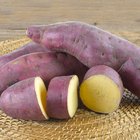
Difference in Sugar Content of Sweet ...

How to Bake White Potatoes
Nutrition Information of Jewel Yams

The Calories in Jacket Potatoes With ...

Calories in a Skinless Baked Potato
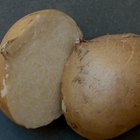
Can You Bake Jicama Like a Potato?

How Much Whole Grain Should You Eat a ...
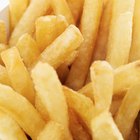
What Are Yellow Potatoes?
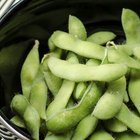
List of High Protein Vegetables

Raw Potato for Wrinkles

Nutritional Value of Red-Skin Potatoes

What Is the Nutritional Value of ...

Nutritional Value of a D'Anjou Pear

How to Cook Fresh Jicama
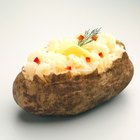
How to Cut Baked Potatoes
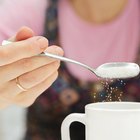
How to Substitute Splenda for Sugar
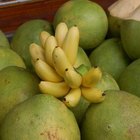
Foods From Rainforest Plants

How Many Calories in a Baked Potato ...
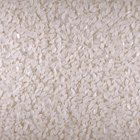
How to Bake With Rice & Potato Flours
References
- Mail Online: Devils' Food? The Surprising Health Benefits of the Humble Spud
- MayoClinic.com: Dietary Fiber - Essential for a Healthy Diet
- Tufts OpenCourseWare: Fiber
- USDA National Nutrient Database for Standard Reference: Nutrient Data for 11674, Potato, Baked, Flesh and Skin, Without Salt
- USDA National Nutrient Database for Standard Reference, Release 25: Fiber, Total Dietary (g) Content of Selected Foods per Common Measure, Sorted by Nutrient Content
- Vegetarian Times: Ask the Nutritionist - How Much Fiber Do I Really Need?
- Harvard University Health Services: Fiber Content of Foods in Common Portions
- Clemson Cooperative Extension: Fiber
- Reader's Digest: The Health Properties of Sweet Potatoes
Writer Bio
Michelle Kerns writes for a variety of print and online publications and specializes in literature and science topics. She has served as a book columnist since 2008 and is a member of the National Book Critics Circle. Kerns studied English literature and neurology at UC Davis.
Photo Credits
George Doyle/Stockbyte/Getty Images